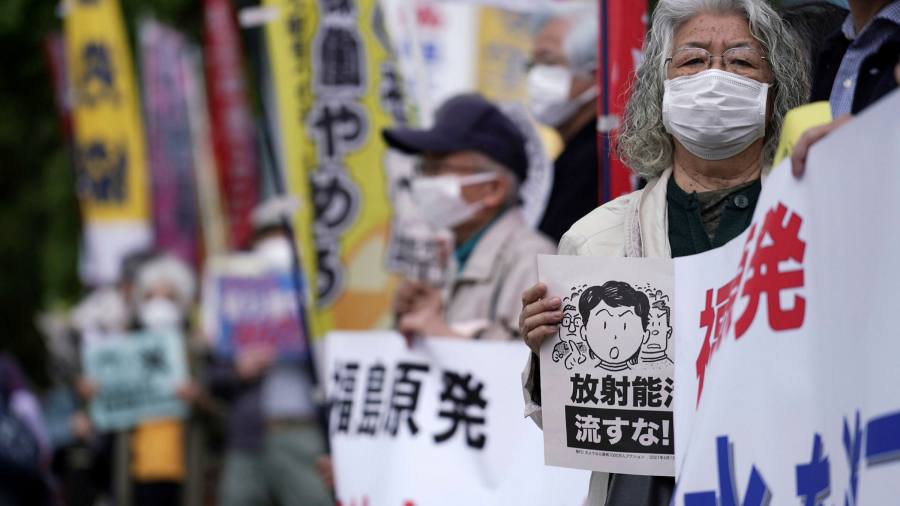[ad_1]
Japan will release more than 1m tonnes of contaminated water from the Fukushima Daiichi nuclear power plant into the Pacific, a move condemned by environmentalists, fishermen and neighbouring countries.
Tokyo Electric, the plant’s operator, will construct equipment to dilute and release the water, which has accumulated since three reactors melted down during the 2011 tsunami that overwhelmed the facility. Discharges will start in about two years, subject to final approval by nuclear regulators.
The decision — made after years of public consultations and wrangling by expert committees — risked reviving some of the trauma of the nuclear accident and worsening its legacy of pollution.
But Japanese authorities argued that there was no practical alternative to releasing the water as storage space ran out. They add there was no risk to human health and that operating nuclear plants around the world release similar water every day.
“In decommissioning Fukushima Daiichi, we cannot avoid the wastewater issue,†said Prime Minister Yoshihide Suga after a meeting of cabinet ministers and policy experts in Tokyo.
“Therefore, based on an approach that clearly exceeds safety standards and a thorough plan to avoid reputational damage, we have judged it is pragmatic to release water to the ocean.â€
The Fukushima reactors melted in March 2011 after a devastating tsunami knocked out their cooling systems. Water subsequently used to cool the reactors, along with groundwater flowing into the site, became contaminated with radioactive nuclides.
The contaminated water has been treated with an elaborate filtration system to remove most of the radioactive material. However, there is no practical way to filter out tritium, a radioactive isotope of hydrogen, the lightest element in the periodic table.
Tritium has a half-life of 12.3 years, the time needed for half of the initial radioactivity to decay. Radiation can be dangerous to health but everybody is exposed to a certain amount of background radiation, with higher doses when taking a long-distance flight or receiving an X-ray.
Japan’s government claims that the radiation dose from Fukushima water would be no more than 1/1,000th of the natural exposure, even if it were all released in a single year.
The government considered several alternatives, including evaporating the water into the atmosphere or injecting it into underground reservoirs. But experts argued that diluting the water and slowly releasing it into the ocean was the only viable choice.
“We will dilute the tritium to one-fortieth of the domestic standard and one-seventh of the World Health Organization standard for drinking water,†said Suga. He said the process would be fully open to inspection by the International Atomic Energy Agency.
Even though the water will ultimately be diluted in the wider Pacific, Japan’s fishing industry feared renewed damage to its reputation. Some countries maintain bans on Japanese fish and other foods imposed after the Fukushima disaster.
“This decision is extremely regrettable and we do not accept it at all,†said Hiroshi Kishi, chair of the National Federation of Fisheries co-operatives. “We hereby register our strong objections.â€
Environmentalists said Japan had ignored the option of storing the water indefinitely and had chosen the cheapest approach of dumping it in the ocean. “The government has taken the wholly unjustified decision to deliberately contaminate the Pacific Ocean with radioactive waste,†said Kazue Suzuki, a campaigner at Greenpeace Japan.
South Korea expressed its “strong regret†but the US cautiously endorsed Japan’s approach.
“Japan has weighed the options and effects, has been transparent about its decision, and appears to have adopted an approach in accordance with globally accepted nuclear safety standards,†said the US state department.
[ad_2]
Source link





